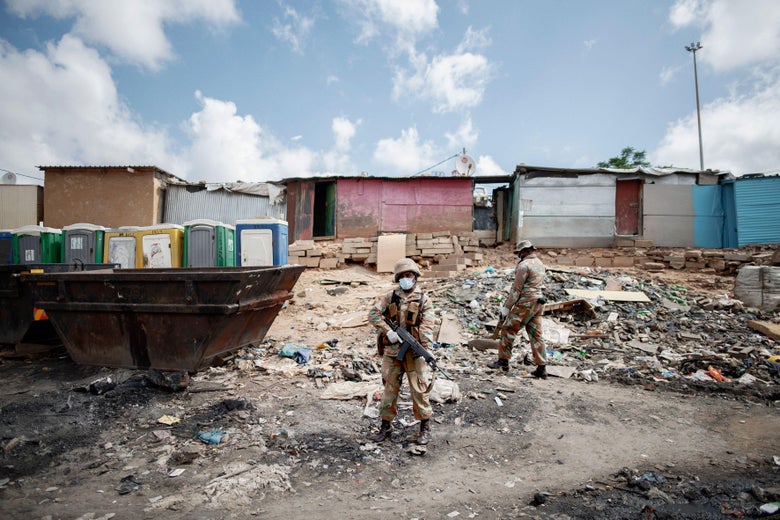
South African National Defence Force soldiers during a raid of the Madala hostel in Alexandra township on March 28.
Luca Sola/Getty Images
Slate is making its coronavirus coverage free for all readers. Subscribe to support our journalism. Start your free trial.
The economic devastation wrought by COVID-19 is still coming into focus in the United States, China, and Europe, but for the world’s poorest countries, it’s likely to be exponentially worse. Before it’s over, the crisis could wipe out a decade of progress against global poverty and lead to the first overall increase in extreme poverty in 30 years, according to a new analysis. As many as half a billion people could fall below the poverty line.
The report from the World Institute for Development Economics Research at United Nations University, a U.N.-founded think tank, finds that if global incomes drop 5 percent due to the pandemic—a conservative estimate of the likely consequences from multiple months of lockdown—the number of people living in extreme poverty (measured as wages of $1.90 per day) would increase by 1 percent. A more drastic 10 percent contraction would increase the extreme poverty rate by up to 6 percent. The U.N.’s Sustainable Development Goals, which call for entirely eliminating extreme poverty by 2030, are looking very shaky right now.
This would mark the first overall increase in global poverty since 1990. Regions where poverty rates are already highest would be the worst hit: 80 percent of those newly plunged into poverty would likely be in South Asia and sub-Saharan Africa. If you measure poverty as an income of $5.50 per day, another common benchmark, East Asia would see the most dramatic increases.
Developing countries are uniquely vulnerable to the outbreak itself. Their medical systems often don’t have the resources of wealthier countries, which have themselves been overwhelmed in this pandemic. In crowded slums, social distancing is impossible, and limited access to fresh water makes frequent hand-washing a luxury. Aware of these vulnerabilities, many developing countries have been extremely proactive in combating the outbreak. El Salvador declared a quarantine before it even had a single case, to take one extreme example. India’s 1.3 billion people are currently in the middle of an unprecedented lockdown, and the government of the country’s most populous state, Uttar Pradesh, says the quarantine won’t be lifted as long as there’s a single case.
These lockdowns, even if they sometimes come with ulterior motives, are necessary but devastating to the world’s most economically vulnerable people. And the kind of business bailouts being implemented in many developed countries are difficult to carry out in countries where most people work in the informal sector. Moreover, the remittances from migrant workers that form the lifeblood of many developing countries have slowed to a trickle as wealthy countries have shut down their own economies.
Citing the UNU report, Oxfam is calling on world leaders to agree to an ambitious rescue package for poor countries including $1 trillion in debt cancellations or postponements. Reeling from their own crises, wealthy national governments might not be in the most generous mood. But as one Ghanaian official put it, discussing the challenge facing Africa, this is a “ ‘break the glass’ moment.”
from Slate Magazine https://ift.tt/2XkWt4H
via IFTTT
沒有留言:
張貼留言